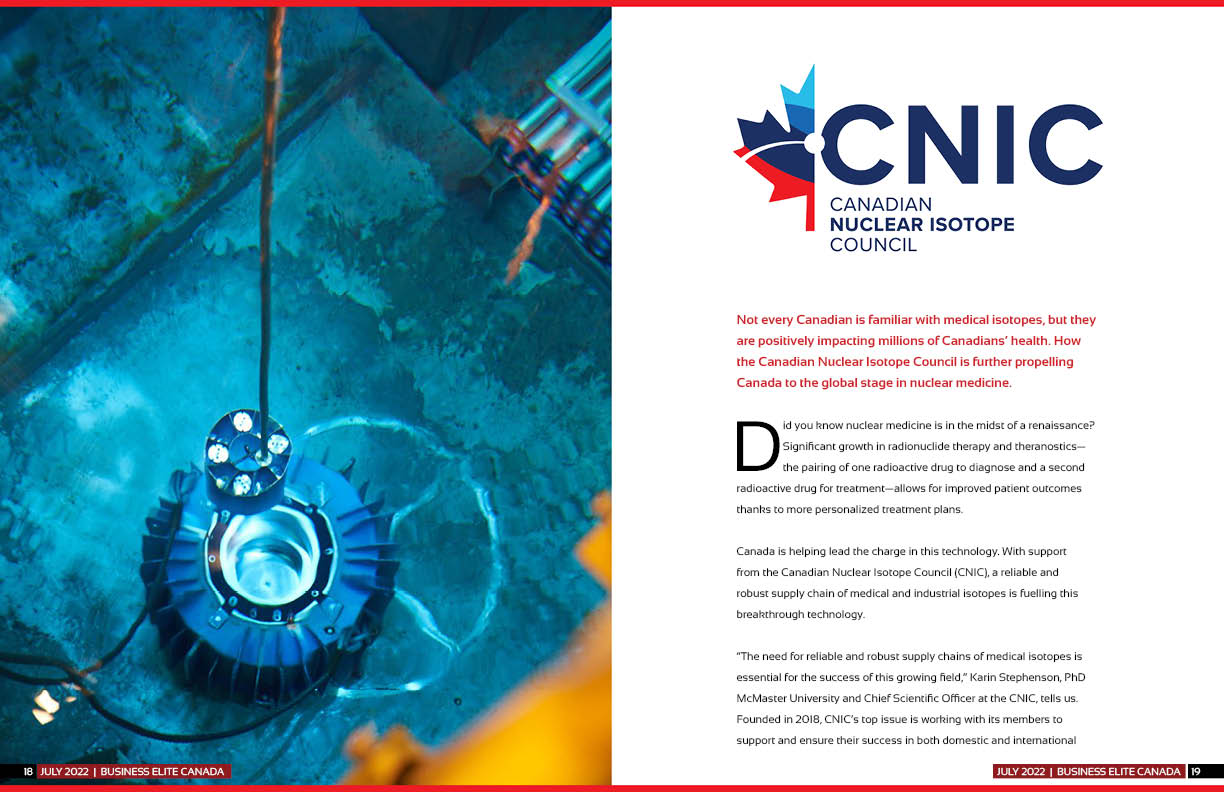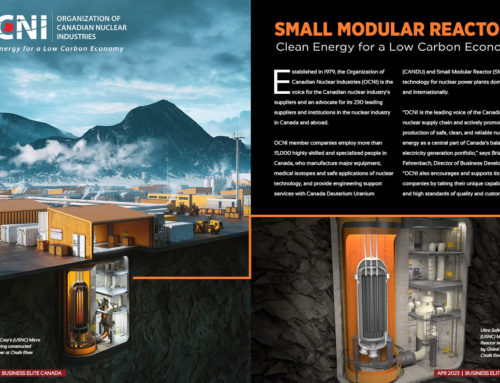Not every Canadian is familiar with medical isotopes, but they are positively impacting millions of Canadians’ health. How the Canadian Nuclear Isotope Council is further propelling Canada to the global stage in nuclear medicine.
Did you know nuclear medicine is in the midst of a renaissance? Significant growth in radionuclide therapy and theranostics— the pairing of one radioactive drug to diagnose and a second radioactive drug for treatment—allows for improved patient outcomes thanks to more personalized treatment plans.
Canada is helping lead the charge in this technology. With support from the Canadian Nuclear Isotope Council (CNIC), a reliable and robust supply chain of medical and industrial isotopes is fuelling this breakthrough technology.
“The need for reliable and robust supply chains of medical isotopes is essential for the success of this growing field,” Karin Stephenson, PhD McMaster University and Chief Scientific Officer at the CNIC, tells us.
Founded in 2018, CNIC’s top issue is working with its members to support and ensure their success in both domestic and international isotope markets “so that the industry and ultimately patients get the treatments they need,” says Stephenson.
As an independent organization consisting of representatives from various levels within the Canadian health sector, nuclear industry, isotope supply chain, medical professionals, researchers and academics, the CNIC serves as a voice in safeguarding the continued availability of isotopes, ensuring our public policies are risk-informed and science-based, and supported at the highest levels of public health and safety.
“It’s only been three years, but the Canadian Nuclear Isotope Council (CNIC) has quickly emerged as the champion of Canada’s involvement in the global nuclear medicine industry through the production of medical and industrial isotopes,” says Stephenson.
Canada is poised to play an even bigger role in the medical isotope supply chain. The CNIC leverages national capabilities in both research and power reactors as well as the most powerful accelerators in the world.
What is the Mission of the CNIC?
“Canada has the capacity and knowledge infrastructure to support the needs of the industry,” says Stephenson, adding the CNIC mission is two-fold. “First, to deliver value to our members through programs and initiatives that support their success in the domestic and international isotope markets. Second, to inform all citizens about the inherent value of continued Canadian leadership in isotopes.”
Isotope Production System (IPS)—a ground-breaking achievement
CANDU power reactors—a Canadian technology—are uniquely suited to isotope production due to their ability for on-power fueling, which allows for steady-state conditions suitable for irradiating isotopes. “Cobalt-60 (a long-lived medical isotope), which has been produced in CANDU reactors for decades, is used in life-saving cancer treatments, is critical to the sterilization of medical equipment, and helps keep the world’s hospitals clean and safe through the COVID-19 pandemic,” says Stephenson.
A unique IPS is underdevelopment at OPG. OPG will soon expand the production of medical isotopes to its Darlington Nuclear station.
An innovative collaboration between OPG’s wholly-owned subsidiary, Laurentis Energy Partners, and BWX Technologies (BWXT) will see Molybdenum-99 harvested from reactors at Darlington.
“Under this important supply agreement, the reactor will provide irradiation services to produce an isotope that is used in over 30 million diagnostic and medical imaging treatments around the world each year, helping to detect illnesses like cancer and heart disease,” says Stephenson.
Another new IPS system is in development at Bruce Power. This is a significant achievement as it will make Bruce Power the first power reactor in the world to produce short-lived medical isotope, Lutetium-177. Lutetium-177 is needed in nuclear medicine applications for targeted cancer treatments that offer doctors an alternative to traditional chemotherapy techniques.
Bruce Power’s production of Lutetium-177 adds tremendous capacity and stability to the supply. The reliable supply of isotopes supports the entire ecosystem from research and development to commercialization.
The global advancement of nuclear isotopes
CNIC is quickly becoming a go-to reliable information source for government and industry. It has held both North American and European trade missions to foster new business opportunities and collaborations for our members and the global community. Fostering these relationships helps advance the industries global supply chain.
Since its inception, the CNIC has achieved tremendous growth, expanding from just 15 member organizations to well over 76 members and growing today. Its impact has been acknowledged by multiple levels of government across Canada. “Despite this progress, we’ve only just begun,” says Stephenson.
For more information, please visit www.canadianisotopes.ca






